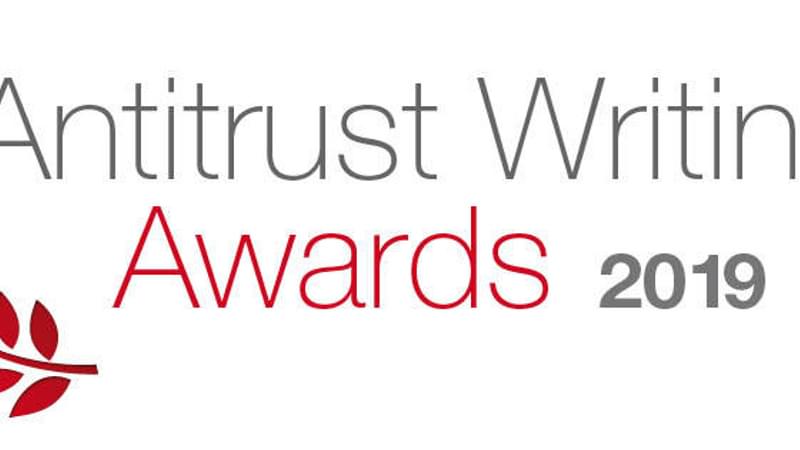2020 Antitrust Writing Awards Nominees

Share
Five academic articles (co-)authored by Compass Lexecon experts have been nominated in the 2020 Antitrust Writing Awards on topics including Big Tech Banking, the competitive impact of legacy airline mergers, and the economics of patent licensing and technical standards. The articles have been shortlisted by the independent Awards Committee from over 600 submissions and will be reviewed by a Jury with the winners announced on 21 April. Readers can vote online until 20 April 2020.
View the nominated articles
AN ECONOMIC APPROACH TO ANTITRUST ANALYSIS OF DISCRIMINATORY LICENSING, GRANTBACKS AND CROSS-LICENSES, NO-CHALLENGE CLAUSES, AND PATENT THICKETS
Jorge Padilla and Koren Wong-Ervin, Concurrences N° 3-2019 l pp. 44-51
Antitrust enforcement involving intellectual property rights - particularly standard-essential patents - continues to receive significant global attention. Jorge Padilla and Koren Wong-Ervin provide an economic approach to the antitrust analysis of discriminatory licensing, grantbacks and cross-licenses, no-challenge clauses, and so-called “patent thickets”. They set straight some common misconceptions about the economics of patents, licensing and technical standards. They also address the ex-ante incremental (or “inherent”) value approach for the valuation of standard-essential patents.
Read the article on the Concurrences website | Download an Expert Opinion summary
ARE LEGACY AIRLINE MERGERS PRO- OR ANTI-COMPETITIVE? EVIDENCE FROM RECENT U.S. AIRLINE MERGERS
Dennis W. Carlton, Ian MacSwain, Mark A. Israel and Eugene Orlov, International Journal of Industrial Organization 62 (2019) 58–95.
Due to a series of recent mergers, the number of legacy airlines in the United States has decreased from six to three. We conduct a comprehensive investigation of the effect on fares and output of these legacy airline mergers to determine whether the mergers have had an overall pro-competitive or anti-competitive effect on consumers. Our analysis shows that these mergers have been pro-competitive, with no significant adverse effect on nominal fares and with significant increases in passenger traffic as well as capacity. Taken together, the results indicate that the recent legacy mergers were pro-competitive.
Read the article on the Concurrences website
BIG TECH BANKING
Jorge Padilla and Miguel de la Mano, Journal of Competition Law & Economics, Volume 14, Issue 4, 2018, Pages 494–526, April 2019
The entry of Big Tech players, such as Google, Facebook, and Amazon, into online banking is likely to have a radical impact on competition in retail banking. Consumers may benefit through better functionality and quality, as well as from innovative financial products and services. However, Big Tech companies may succeed in monopolizing the origination and distribution of loans to consumers and SMEs, forcing traditional banks to become “low-cost manufacturers”, which merely fund the loans intermediated by the Big Techs. This may harm competition, reduce consumer welfare and bring about an increase in financial instability. Jorge Padilla and Miguel de la Mano discuss alternative policy responses aimed at maximizing the positive impact on consumer welfare of Big Tech entry while limiting the risk of monopolization as well as the potential adverse implications of such entry on market integrity and financial stability.
Read the article on the Concurrences website | Download an Expert Opinion summary
MEANS AND ENDS IN COMPETITION LAW ENFORCEMENT
John Davies, Frédéric Jenny Liber Amicorum, 2019
Should competition law enforcement change its focus away from competition and measures of welfare towards broader objectives, such as greater equality, employment or economic development? John Davies suggests that building a case for this solely based on values is not enough: it is also necessary to demonstrate that such an approach is effective. There is little direct evidence to support the idea that competition law is the best way to pursue these goals but there is indirect evidence, from regulatory policies, that such interventions can perversely harm the very objectives they seek to promote. The evidence is not conclusive, but it places the onus on proponents of alternative ends for competition law to demonstrate that their means of achieving such ends will work.
Read the article on the Concurrences website
TRANSACTION COSTS AND COMPETITION POLICY
Dennis W. Carlton, International Journal of Industrial Organization, Forthcoming, 2020
Dennis Carlton evaluates current antitrust policy in light of our current understanding of how transaction costs influence the ability of firms and consumers to deal with market power. His paper shows how the failure to consider transaction costs can lead to erroneous policy decisions. Many models employed today make simplifying assumptions about transaction costs that can lead to biased results in analyzing vertical and horizontal issues. The increased ability to monitor the effect of promotional behavior should cause us to re-examine whether free-riding justifications, previously accepted as justifications for various vertical restrictions, still hold. The increasing importance of two-sided markets together with an understanding of transaction costs is needed to understand antitrust conduct in those markets.


